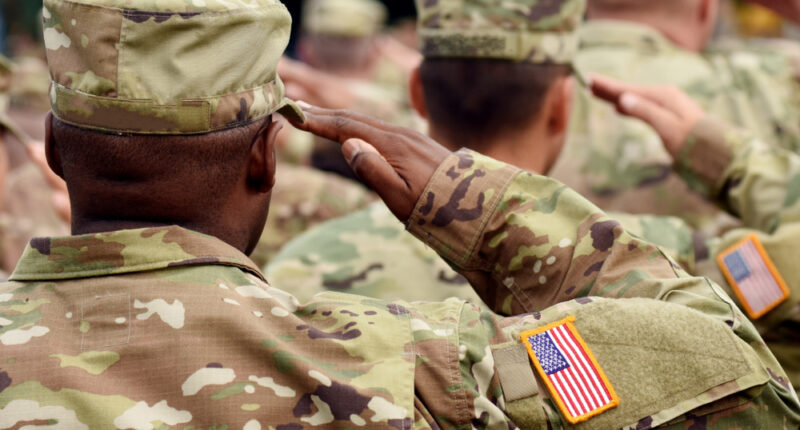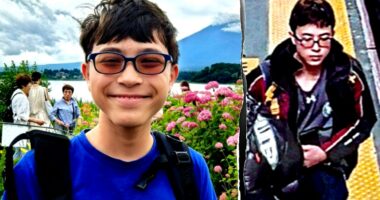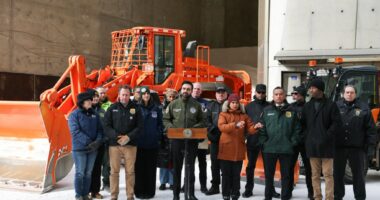Share this @internewscast.com

Every Veterans Day, America takes a moment to acknowledge its military heroes with heartfelt “thank yous,” social media brimming with patriotic tributes, and flags proudly displayed at parades. However, as a female combat veteran who served in Iraq as an Army ammunition specialist and now resides in New York, I find these expressions of gratitude feel insincere, especially when the programs that promote equity and enhance military efficacy are being dismantled.
Earlier this year, the Department of Veterans Affairs (VA) announced a significant policy shift, ceasing all diversity, equity, and inclusion (DEI) initiatives, a move that halts millions in funding. Additionally, the VA plans to cut approximately 30,000 employees by the end of 2025. This reduction poses a serious threat to the accessibility of care in VA hospitals across New York, from the Bronx to Brooklyn. The decrease in clinicians and caseworkers is likely to result in prolonged wait times, increased backlogs in disability claims, and a diminished capacity to address trauma and housing issues. With New York’s VA system serving more than 600,000 veterans, such cuts are unsustainable.
DEI programs were essential because the military and VA systems were not originally designed to accommodate the diverse veteran population of today. It wasn’t until 2015 that women were fully integrated into all combat roles. Furthermore, Black, Latino, Asian-American, Native, and immigrant service members have long highlighted issues of unequal discipline and biased evaluations. LGBTQ service members, previously under the constraints of “Don’t Ask, Don’t Tell,” continue to face care disparities. Veterans with disabilities often encounter neglected injuries and trauma that go unaddressed.
These DEI initiatives were not just symbolic gestures but necessary structural corrections to ensure fairness and enhance military effectiveness.
Today, women constitute nearly one in five active-duty service members. They serve in roles ranging from combat engineer to pilot, yet face disproportionately high rates of sexual harassment and assault. Annually, about 6.8% of women experience unwanted sexual contact compared to 1.3% of men. A Government Accountability Office (GAO) review found that female enlisted personnel are up to 2.5 percentage points less likely to advance than their male peers.
Race also deeply influences the military experience and veteran outcomes. Another GAO review exposed significant racial disparities in evaluations and career advancement. Black service members, for example, are disproportionately subjected to military justice actions, facing courts-martial or non-judicial punishment up to 2.6 times more frequently than their white counterparts. Black veterans also suffer from lower disability claim approval rates and longer appeal processes. These disparities profoundly affect their careers, benefits, and lives.
For many women, the challenges intensify after service. Female veterans are the fastest-growing part of the veteran population and are three to four times more likely than non-veteran women to experience homelessness. Between 2020 and 2023, homelessness among female veterans rose 24% even as overall veteran homelessness declined.
Military sexual trauma is one of the strongest predictors of PTSD and housing instability. LGBTQ veterans often encounter shelters and services that are unsafe or unwelcoming. These outcomes reflect the inequities that DEI programs addressed.
This is not about political correctness. It is about fairness and national security. Our military is strongest when it reflects the nation it defends and draws on the full range of available talent.
DEI initiatives helped ensure that VA clinicians understood how trauma shows up differently across gender and race, that leadership pipelines included women, and that bias didn’t quietly dictate who got promoted or cared for. Ending those programs doesn’t make our institutions stronger; it makes them less prepared, less responsive, and less capable of protecting the people they serve.
National defense depends on people. The entire force suffers when service members or veterans are pushed out or overlooked because of their identity. DEI is essential to readiness.
Here in New York, home to one of the largest veteran populations in the country, the loss of DEI capacity is already being felt. Female veterans rely on VA facilities in the Bronx, Brooklyn, and Northport for reproductive health care, mental health counseling, and housing programs that are now at risk as budgets shrink. Cutting inclusion efforts weakens the systems that make national defense possible.
Veterans Day should be about more than parades and platitudes. If we truly value the sacrifices of our veterans, we must also value inclusion. A country that only honors some of its veterans honors none of them.
I am proud of my service. But patriotism requires confronting who benefits from our institutions and who is left behind. The fight for diversity, equity, and inclusion is not separate from the fight for democracy. It is the same fight.
So this Veterans Day, when politicians post photos of themselves shaking hands with veterans, ask them what they have done to protect the people who served once the cameras are gone. Gratitude without justice is empty. Inclusion is how we honor service in full.
Amaru is an advocacy and policy strategist and a Ph.D. student at the CUNY Graduate Center.














